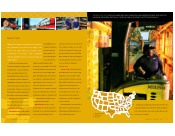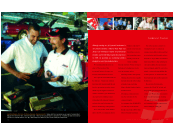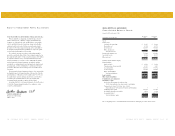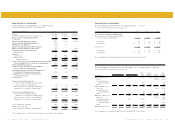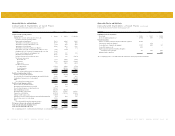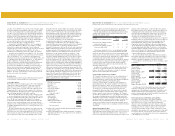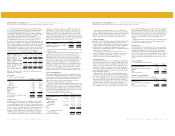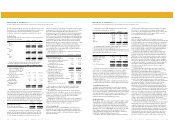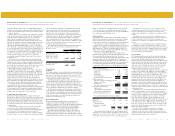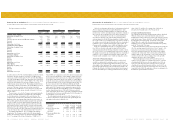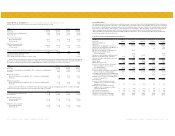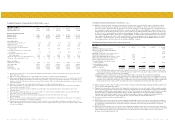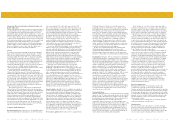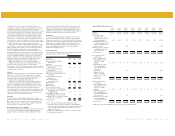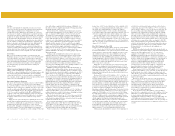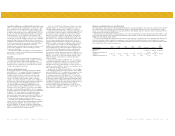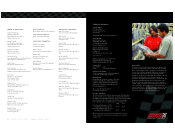Advance Auto Parts 2001 Annual Report Download - page 19
Download and view the complete annual report
Please find page 19 of the 2001 Advance Auto Parts annual report below. You can navigate through the pages in the report by either clicking on the pages listed below, or by using the keyword search tool below to find specific information within the annual report.
32 ADVANCE AUTO PARTS ANNUAL REPORT 2001 ADVANCE AUTO PARTS ANNUAL REPORT 2001 33
against the Company on July 28, 1998, for wrongful death relating to an
automobile accident involving a team member of the Company. This matter
has since been settled with no impact to the Company’s financial position
or results of operations.
In October 2000, a vendor repudiated a long-term purchase agreement
entered into with the Company in January 2000. The Company filed suit
against the vendor in November of fiscal 2000 to recover monetary
damages. Based on consultation with the Company’s legal counsel,
management believed the purchase agreement was entered into in good
faith and it was highly probable that the Company would prevail in its suit.
Therefore, the Company recorded a gain of $3,300, which represented
actual damages incurred through December 30, 2000, as a reduction of
cost of sales in the accompanying consolidated statement of operations for
the year ended December 30, 2000. Related income taxes and legal fees of
$1,300 were also recorded in the accompanying consolidated statement of
operations for the year ended December 30, 2000. During the first quarter
of fiscal 2001, the Company reached a settlement with this vendor and
recorded a net gain of $8,300 as a reduction to cost of sales in the
accompanying consolidated statement of operations for the year ended
December 29, 2001.
The Company is also involved in various other claims and lawsuits
arising in the normal course of business. The damages claimed against the
Company in some of these proceedings are substantial. Although the final
outcome of these legal matters cannot be determined, based on the facts
presently known, it is management’s opinion that the final outcome of such
claims and lawsuits will not have a material adverse effect on the
Company’s financial position or results of operations.
The Company is self-insured with respect to workers’ compensation
and health care claims for eligible active team members. In addition, the
Company is self-insured for general and automobile liability claims. The
Company maintains certain levels of stop-loss insurance coverage for these
claims through an independent insurance provider. The cost of self-
insurance claims is accrued based on actual claims reported plus an
estimate for claims incurred but not reported. These estimates are based on
historical information along with certain assumptions about future events,
and are subject to change as additional information becomes available.
The Company has entered into employment agreements with certain
team members that provide severance pay benefits under certain
circumstances after a change in control of the Company or upon termination
of the team member by the Company. The maximum contingent liability
under these employment agreements is approximately $10,231 and $4,740
at December 29, 2001 and December 30, 2000, respectively.
20. Other Related-party Transactions:
In September 2001, the Company loaned a member of the Board of
Directors $1,300. This loan is evidenced by a full recourse promissory note
bearing interest at prime rate, payable annually, and due in full in five years
from its inception. Payment of the promissory note is secured by a stock
pledge agreement that grants the Company a security interest in all shares
of common stock owned by the board member under the Company’s stock
subscription plan.
Under the terms of a shared services agreement, Sears provided
certain services to the Company, including payroll and payable
processing for Western, among other services through the third quarter
of fiscal year 1999. The Company and Sears have entered into
agreements that provide for the Western stores to continue to purchase,
at normal retail prices, and carry certain Sears branded products during
periods defined in the agreements. The Company purchased directly
from the manufacturers of Sears branded products of approximately
$4,600, $9,200 and $13,500 for the fiscal years ended December 29,
2001, December 30, 2000 and January 1, 2000, respectively. The
Company is also a first-call supplier of certain automotive products to
certain Sears Automotive Group stores. Additionally, Sears arranged to
buy from the Company certain products in bulk for its automotive
centers through January 1999. These transactions are completed at the
Company’s normal retail prices. These amounts are included in net sales
to Sears in the following table and have been negotiated based on the
fair values of the underlying transactions.
The following table presents the related party transactions with Sears
for fiscal 2001, 2000 and 1999 and as of December 29, 2001 and
December 30, 2000:
Years Ended
December 29, December 30, January1,
2001 2000 2000
Net sales to Sears $ 7,535 $ 7,487 $ 5,326
Shared services revenue - - 2,286
Shared services expense - - 887
Credit card fees expense 339 405 348
December 29, December 30,
2001 2000
Receivables from Sears $ 812 $ 3,160
Payables to Sears 1,220 1,321
21. Benefit Plans:
401(k) Plan
The Company maintains a defined contribution team member benefit plan,
which covers substantially all team members after one year of service. The
plan allows for team member salary deferrals, which are matched at the
Company’s discretion. Company contributions were $5,033 in fiscal 2001,
$5,245 in fiscal 2000, and $4,756 in fiscal 1999.
The Company continues to maintain a defined contribution plan
covering substantially all of the Discount team members who have at least
one year of service. The plan allows for team member salary deferrals,
which are matched by the Company based upon the team member’s years
of service. Company contributions were $205 in fiscal 2001. The Company
had no contributions for this plan prior to the Discount acquisition.
The Company also maintains a profit sharing plan covering Western
team members that was frozen prior to the Western Merger on November
2, 1998. This plan covered all full-time team members who had completed
one year of service and had attained the age of 21 on the first day of each
month. All team members covered under this plan were included in the
Company’s plan on December 30, 2000.
Deferred Compensation
The Company maintains an unfunded deferred compensation plan
established for certain key team members of Discount prior to the
acquisition on November 28, 2001. The Company assumed the plan liability
of $1,382 through the Discount acquisition. The Company anticipates
terminating this plan in May of 2002 and has reflected this liability in
accrued expenses in the accompanying consolidated balance sheets.
The Company maintains an unfunded deferred compensation plan
established for certain key team members of Western prior to the fiscal
1998 Western Merger. The Company assumed the plan liability of $15,253
through the Western Merger. The plan was frozen at the date of the Western
Advance Auto Parts, Inc. and Subsidiaries Notes to Consolidated Financial Statements (continued)
December 29, 2001, December 30, 2000 and January 1, 2000 (in thousands, except per share data and per store data)
Merger. As of December 29, 2001 and December 30, 2000, $4,291 and
$5,359, respectively was accrued with the current portion included in
accrued expenses and the long-term portion in other long-term liabilities in
the accompanying consolidated balance sheets.
Postretirement Plan
The Company provides certain health care and life insurance benefits for
eligible retired team members. Team members retiring from the Company
with 20 consecutive years of service after age 40 are eligible for these
benefits, subject to deductibles, co-payment provisions and other limitations.
The estimated cost of retiree health and life insurance benefits is
recognized over the years that the team members render service as required
by SFAS No. 106, “Employers Accounting for Postretirement Benefits
Other Than Pensions.” The initial accumulated liability, measured as of
January 1, 1995, the date the Company adopted SFAS No. 106, is being
recognized over a 20-year amortization period.
In connection with the Western Merger, the Company assumed
Western’s benefit obligation under its postretirement health care plan. This
plan was merged into the Company’s plan effective July 1, 1999.
The Company maintains the existing plan and the assumed plan covering
Western team members. Financial information related to the plans was
determined by the Company’s independent actuaries as of December 29,
2001 and December 30, 2000. The following provides a reconciliation of the
accrued benefit obligation included in other long-term liabilities in the
accompanying consolidated balance sheets and the funded status of the plan.
2001 2000
Change in benefit obligation:
Benefit obligation at beginning of the year $ 22,082 $ 22,095
Service cost 326 451
Interest cost 1,584 1,532
Benefits paid (2,842) (2,826)
Actuarial (gain) loss (3,790) 830
Benefit obligation at end of the year 17,360 22,082
Change in plan assets:
Fair value of plan assets at beginning of the year - -
Employer contributions 2,842 2,826
Benefits paid (2,842) (2,826)
Fair value of plan assets at end of year - -
Reconciliation of funded status:
Funded status (17,360) (22,082)
Unrecognized transition obligation 752 810
Unrecognized actuarial (gain) loss (3,260) 530
Accrued postretirement benefit cost $ (19,868) $ (20,742)
Net periodic postretirement benefit cost is as follows:
2001 2000 1999
Service cost $ 326 $ 451 $ 336
Interest cost 1,584 1,532 1,401
Amortization of the
transition obligation 58 58 58
Amortization of recognized
net losses - - 43
$ 1,968 $ 2,041 $ 1,838
The postretirement benefit obligation was computed using an assumed
discount rate of 7.5% in 2001 and 2000. The health care cost trend rate was
assumed to be 8.5% for 2001, 8.0% for 2002, 7.5% for 2003, 7.0% for 2004,
6.5% for 2005, 6.0% for 2006, and 5.0% to 5.5% for 2007 and thereafter.
If the health care cost were increased 1% for all future years the
accumulated postretirement benefit obligation would have increased by
$2,296 as of December 29, 2001. The effect of this change on the
combined service and interest cost would have been an increase of $185
for 2001.
If the health care cost were decreased 1% for all future years the
accumulated postretirement benefit obligation would have decreased by
$1,996 as of December 29, 2001. The effect of this change on the
combined service and interest cost would have been a decrease of $160
for 2001.
The Company reserves the right to change or terminate the benefits
or contributions at any time. The Company also continues to evaluate
ways in which it can better manage these benefits and control costs. Any
changes in the plan or revisions to assumptions that affect the amount of
expected future benefits may have a significant impact on the amount of
the reported obligation and annual expense.
22. Stock Options:
The Company maintains a senior executive stock option plan and an
executive stock option plan (the “Option Plans”) for key team members
of the Company. The Option Plans provide for the granting of non-
qualified stock options. All options terminate on the seventh anniversary
of the grant date. Shares authorized for grant under the senior executive
and the executive stock option plans are 1,710 and 3,600, respectively,
at December 29, 2001. Subsequent to December 29, 2001, the Board
of Directors approved for the grant of 532 options to purchase the
Company’s common stock at an exercise price of $42.00.
The Company has historically maintained three types of option plans;
Fixed Price Service Options (“Fixed Options”), Performance Options
(“Performance Options”) and Variable Option plans (“Variable Options”).
The Fixed Options vest over a three-year period in three equal
installments beginning on the first anniversary of the grant date. During
the fourth quarter of fiscal 2001, the board of directors approved an
amendment to the Performance Options and the Variable Options. The
amendment accelerated the vesting of the Performance Options by
removing the variable provisions under the plan and established a fixed
exercise price of $18.00 per share for the Variable Options. As a result of
the increase in the Company’s stock price and the above amendment, the
Company recorded a one-time expense of $8,611 to record the associated
compensation expense.
Additionally, as a result of the Discount acquisition, the Company
converted all outstanding stock options of Discount with an exercise
price greater than $15.00 per share to options to purchase the Company’s
common stock. The Company converted 575 options from the executive
stock option plan at a weighted-average exercise price of $38.89 per
share. These options will terminate on the tenth anniversary of the
original option agreement between Discount and the team member and as
of December 29, 2001 had a weighted-average contractual life of five
years. At December 29, 2001, all Discount shares were exercisable and
had a range of exercise prices of $17.46 to $59.18. The fair value of the
options to purchase the Company’s common stock was included in the
purchase price of Discount (Note 3).
As a result of the recapitalization in fiscal 1998 an existing
stockholder received stock options to purchase up to 500 shares of
common stock. The stock options are fully vested, nonforfeitable and
provide for a $10.00 per share exercise price, increasing $2.00 per share
annually, through the expiration date of April 2005.
Advance Auto Parts, Inc. and Subsidiaries Notes to Consolidated Financial Statements (continued)
December 29, 2001, December 30, 2000 and January 1, 2000 (in thousands, except per share data and per store data)


